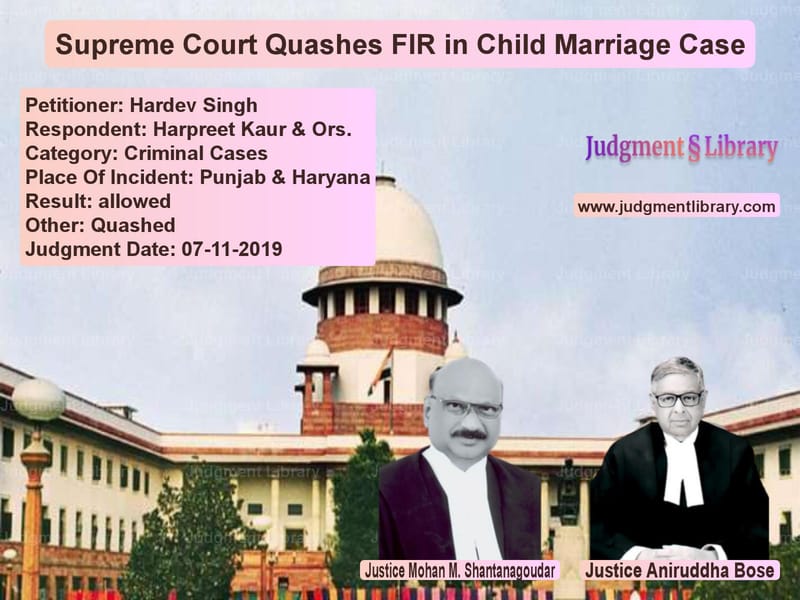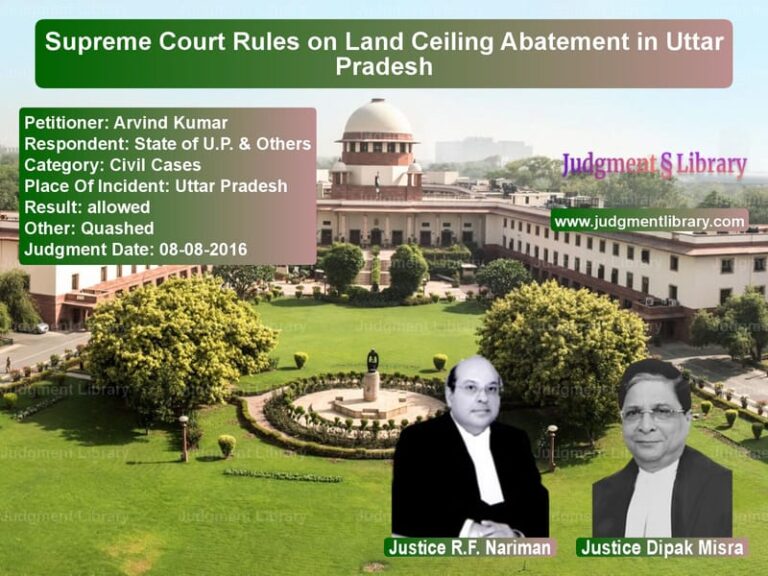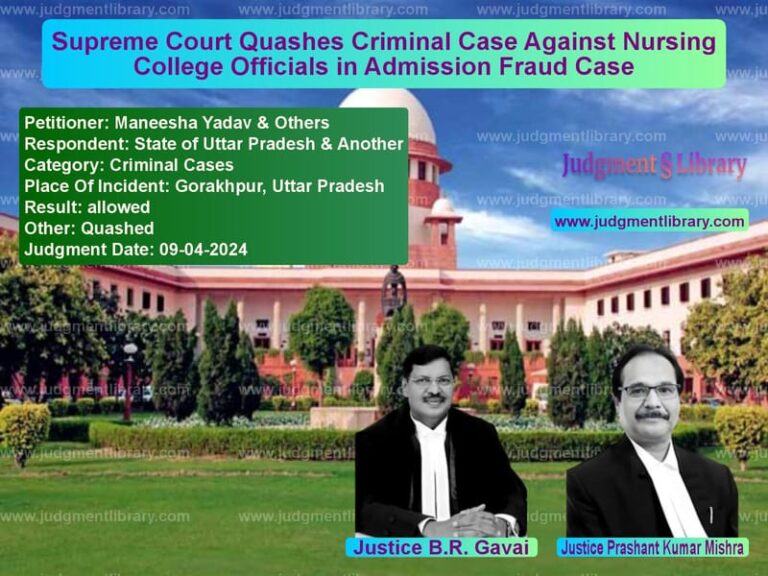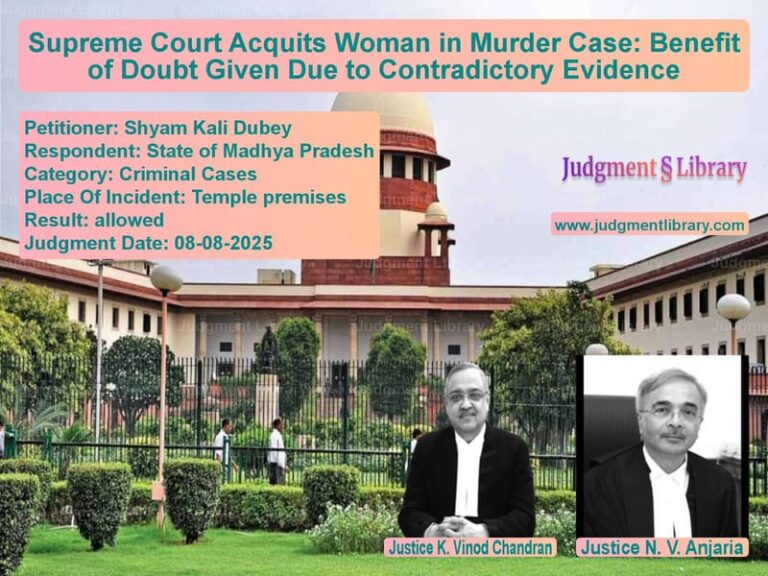Supreme Court Quashes FIR in Child Marriage Case
The Supreme Court of India, in its judgment dated November 7, 2019, delivered a significant ruling in the case of Hardev Singh vs. Harpreet Kaur & Ors.. This case involved the legality of a child marriage and whether an FIR registered under Section 9 of the Prohibition of Child Marriage Act, 2006 (2006 Act), against the petitioner should be quashed. The ruling sheds light on the legal position regarding child marriages in India, the judicial power to recall orders, and the rights of individuals in personal law matters.
Background of the Case
The petitioner, Hardev Singh, and the respondent, Harpreet Kaur, got married on April 17, 2010, without the consent of their parents. Facing familial opposition, they approached the Punjab and Haryana High Court seeking police protection. The High Court, in its order dated April 26, 2010, granted them protection from any threats posed by their family members.
However, the respondent’s father later filed an application before the High Court, alleging that Hardev Singh had misrepresented his age and was a minor at the time of marriage. Based on school records showing that his date of birth was June 30, 1992, the High Court, on November 26, 2010, recalled its earlier order and directed the registration of an FIR against Hardev Singh under Section 9 of the 2006 Act.
Key Legal Issues in the Case
- Whether the Punjab and Haryana High Court had the power to recall its earlier order under Section 482 of the Cr.P.C.
- Whether an FIR under Section 9 of the 2006 Act could be registered against a male minor.
- Whether the petitioner, who was a minor at the time of marriage, could be held liable under the 2006 Act.
- Whether the marriage was valid despite being conducted without parental consent.
Petitioner’s (Hardev Singh’s) Arguments
The petitioner, Hardev Singh, challenged the FIR and presented the following key arguments:
- The Punjab and Haryana High Court lacked jurisdiction to recall its earlier order under Section 482 of the Cr.P.C. since criminal courts do not have inherent review powers.
- The High Court’s decision to direct the registration of an FIR was erroneous because, based on school records, he was 17 years old at the time of marriage, making him a ‘child’ under the 2006 Act.
- The Prohibition of Child Marriage Act, 2006, applies only to adult males marrying minor girls. Since Hardev Singh himself was a minor, the provisions of Section 9 could not be applied against him.
- The marriage was consensual, and neither party had alleged coercion or exploitation, making the criminal proceedings unnecessary.
Respondent’s (Harpreet Kaur’s Father) Arguments
- The father of the respondent argued that Hardev Singh had misrepresented his age in the police protection petition, stating that he was 23 years old, whereas school records showed he was a minor.
- The marriage should be considered invalid under the Prohibition of Child Marriage Act, 2006, since it was conducted while Hardev Singh was underage.
- Legal action should be taken against Hardev Singh to discourage child marriages in society and uphold the legal framework protecting minors.
Supreme Court’s Observations
The Supreme Court made several important observations in its ruling:
- The Punjab and Haryana High Court did not have the power to recall its own order under Section 482 of the Cr.P.C. once it had granted police protection.
- Based on school records, Hardev Singh was 17 years old at the time of marriage, making him a ‘child’ under the 2006 Act.
- Section 9 of the 2006 Act is applicable only to adult males marrying minor girls. Since Hardev Singh himself was a minor, he could not be prosecuted under this section.
- The legislative intent behind the 2006 Act was to protect young girls from forced marriages and not to punish minor males entering into marriages.
Final Judgment
The Supreme Court quashed the FIR and set aside the High Court’s order, ruling that:
- The High Court had committed an error in directing the registration of an FIR under Section 9 of the 2006 Act.
- The case did not fall within the scope of the 2006 Act since the petitioner himself was a minor.
- The couple had been living peacefully without any threat, and no further police protection was required.
Impact of the Judgment
This ruling has several significant legal implications:
- Clarification on Section 9 of the 2006 Act: The judgment clarified that male minors cannot be prosecuted under Section 9 of the Act.
- Judicial Review of Child Marriages: The decision provides clarity on the application of child marriage laws and prevents their misuse.
- Limitations on High Court’s Powers: The ruling reinforced that High Courts cannot recall their own orders in criminal matters.
- Protection of Consensual Marriages: The judgment upheld the rights of consenting individuals in marriages that do not involve coercion or exploitation.
Conclusion
The Supreme Court’s ruling in Hardev Singh vs. Harpreet Kaur & Ors. is a landmark decision clarifying the legal position on child marriage laws and judicial powers. It ensures that male minors are not unfairly prosecuted under the 2006 Act and upholds the fundamental right of individuals to seek protection in cases of familial opposition.
Petitioner Name: Hardev Singh.Respondent Name: Harpreet Kaur & Ors..Judgment By: Justice Mohan M. Shantanagoudar, Justice Aniruddha Bose.Place Of Incident: Punjab & Haryana.Judgment Date: 07-11-2019.
Don’t miss out on the full details! Download the complete judgment in PDF format below and gain valuable insights instantly!
Download Judgment: Hardev Singh vs Harpreet Kaur & Ors. Supreme Court of India Judgment Dated 07-11-2019.pdf
Direct Downlaod Judgment: Direct downlaod this Judgment
See all petitions in Bail and Anticipatory Bail
See all petitions in Juvenile Justice
See all petitions in SC/ST Act Case
See all petitions in Judgment by Mohan M. Shantanagoudar
See all petitions in Judgment by Aniruddha Bose
See all petitions in allowed
See all petitions in Quashed
See all petitions in supreme court of India judgments November 2019
See all petitions in 2019 judgments
See all posts in Criminal Cases Category
See all allowed petitions in Criminal Cases Category
See all Dismissed petitions in Criminal Cases Category
See all partially allowed petitions in Criminal Cases Category







